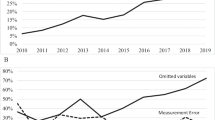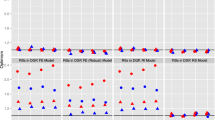Abstract
An increasing number of longitudinal data sets collect expectations information regarding a variety of future individual level events and decisions, providing researchers with the opportunity to explore expectations over micro variables in detail. We present a theoretical framework and an econometric methodology to use that type of information to test the Rational Expectations (RE) hypothesis in models of individual behavior. This RE assumption at the micro level underlies a majority of the research in applied fields in economics, and it is the common foundation of most work in dynamic models of individual behavior. We present tests of three different types of expectations using two different panel data sets that represent two very different populations. In all three cases we cannot reject the RE hypothesis. Our results support a wide variety of models in economics, and other disciplines, that assume rational behavior.
Similar content being viewed by others
References
Arellano M (2003) Panel data econometrics. Oxford University Press, Oxford
Baum CF, Schaffer ME, Stillman S (2003) Instrumental variables and GMM: estimation and testing. Stata J 3(1):1–31
Benítez-Silva H, Dwyer DS (2005) The rationality of retirement expectations and the role of new information. Rev Econ Stat 87(3):587–592
Benítez-Silva H, Dwyer DS (2006) Expectation formation of older married couples and the rational expectations hypothesis. Labour Econ 13(2):191–218
Benítez-Silva H, Ni H (2006) Health stocks and health flows in an empirical model of expected longevity. Manuscript, SUNY-Stony Brook
Bernheim BD (1988) Social security benefits: an empirical study of expectations and realizations. In: Lazear E, Ricardo-Campbell R (eds) Issues in contemporary retirement. Hoover Institution, Palo Alto, pp 312–345
Bernheim BD (1989) The timing of retirement: a comparison of expectations and realizations. In: Wise D (eds) The economics of aging. University of Chicago Press, Chicago, pp 335—355
Bernheim BD (1990) How do the elderly form expectations? An analysis of responses to new information. In: Wise D (ed) Issues in the economics of aging. University of Chicago Press, Chicago, pp 259—285
Bewley TF (1986) Knightian decision theory: Part I. Cowles Foundation Discussion Paper No. 807, Yale University
Bewley TF (1987) Knightian decision theory, Part II: Intertemporal problems. Cowles Foundation Discussion Paper No. 835, Yale University
Black D, Sanders S, Taylor L (2003) Measurement of higher education in the census and current population survey. J Am Stat Assoc 98(463):545–554
Bond S, Nauges C, Windmeijer F (2002) Unit root and identification in autoregressive panel data models: a comparison of alternative tests. IFS Working Paper
Bound J, Jaeger DA, Baker RM (1995) Problems with instrumental variables estimation when the correlation between the instruments and the endogenous explanatory variable is weak. J Am Stat Assoc 90(430):443–450
Christiansen C (2003) Testing the expectations hypothesis using long-maturity forward rates. Econ Lett 78:175–180
Coronado JL, Perozek M (2001) Wealth effects and the consumption of leisure: retirement decisions during the stock market boom of the 1990s. Manuscript, Federal Reserve Board
Das M, Dominitz J, Van Soest A (1999) Comparing predictions and outcomes: theory and application to income changes. J Am Stat Assoc 94(445):75–85
Das M, van Soest A (1997) Expected and realized income changes: evidence from the dutch socio-economic panel. Manuscript, Tilburg University
Das M, van Soest A (2000) Expected versus realized income changes: a test of the rational expectations hypothesis. Manuscript, Tilburg University
Das M, Newey W, Vella F (2003) Nonparametric estimation of sample selection models. Rev Econ Stud 70:33–58
Davies A, Lahiri K (1999) Re-examining the rational expectations hypothesis using panel data on multi-period forecasts. In: Cheng Hsiao, Kajal Lahiri, Lung-Fei Lee, Hashem Pesaran M (eds) Analysis of panels and limited dependent variable models. Cambridge University Press, Cambridge
Deaton A (1997) The analysis of household surveys. Johns Hopkins Press, Baltimore
de Leeuw F, McKelvey MJ (1981) Price expectations of business firms. Brookings Papers on Econ Activity 1981(1):299–314
de Leeuw F, McKelvey MJ (1984) Price expectations of business firms: bias in the short and long run. Am Econ Rep 14:99–110
Disney R, Tanner S (1999) What can we learn from Retirement Expectations data? IFS Working Paper Series W99/17
Dominitz J, Manski CF (1996) Eliciting student expectations of the returns to schooling. J Human Resour 31(1):1–26
Dominitz J, Manski CF (1997) Using expectations data to study subjective income expectations. J Am Stat Assoc 92:855–867
Dominitz J, Manski CF, Heinz J (2002) Social security expectations and retirement savings decisions. NBER Working Paper 8718
Dwyer DS (2002) Planning for retirement: the role of health shocks. Manuscript, SUNY-Stony Brook
Dwyer DS, Hu J (1999) The relationship between retirement expectations and realizations: the role of health shocks. In: Olivia Mitchell, Brett Hammond P, Rappaport AM (eds) Forecasting retirement needs and retirement wealth. University of Pennsylvania Press, Pennsylvania
Ericsson NR, Hendry DF (1999) Encompassing and rational expectations: how sequential corroboration can imply refutation. Empirical Econ 24(1):1–21
Evans GW, Honkapohja S (2001) Learning and expectations in macroeconomics. Princeton University Press, Princeton
Fair RC (1993) Testing the rational expectations hypothesis in macroeconomic models. Oxford Econ Pap 45(2):169–190
Figlewski S, Wachtel P (1981) The formation of inflationary expectations. Rev Econ Stat 63(1):1–10
Figlewski S, Wachtel P (1983) Rational expectations, information efficiency, and tests using survey data. Rev Econ Stat 65(3):529–531
Forni L (2002) Expectations and outcomes. Manuscript, Central Bank of Italy
Friedman M (1951) Comment. In: Haberler G (eds) Conference on business cycles. National Bureau of Economic Research, New York, pp 107–114
Gramlich EM (1983) Models of inflation expectations formation: a comparison of household and economic forecasts. J Money Credit Bank 15:155–173
Haavelmo T (1958) The role of the econometrician in the advancement of economic theory. Econometrica 26(3):351–357
Haider S, Stephens M (2003) Is there a retirement-consumption puzzle? Evidence using subjective retirement expectations. Rev Econ Stat (forthcoming)
Hall R (1978) Stochastic implications of the life cycle-permanent income hypothesis: theory and evidence. J Polit Econ 86:971–987
Hamermesh DS (2004) Subjective outcomes in economics. Southern Econ J 71(1):2–11
Heckman JJ (1979) Sample selection bias as a specification error. Econometrica 47(1):153–161
Hill D, Perry M, Willis RJ (2005) Estimating Knightian uncertainty from survival probability questions on the HRS. Manuscript, University of Michigan
Hurd M, McGarry K (1995) Evaluation of the subjective probabilities of survival in the health and retirement study. J Human Resour 30:s7–s56
Hurd M, Retti M (2001) The effects of large capital gains on work and consumption: evidence from four waves of the HRS. Manuscript, RAND Corporation, Santa Monica
Hurd M, Rohwedder S (2003) The retirement-consumption puzzle: anticipated and actual declines in spending and retirement. NBER Working Paper 9586
Keane MP, Runkle DE (1990) Testing the rationality of price forecasts: new evidence from panel data. Am Econ Rev 80–4:714–735
Kimball Dietrich J, Joines DH (1983) Rational expectations, information efficiency, and tests using survey data: a comment. Rev Econ Stat 65(3):525–529
Kinal T, Lahiri K (1988) A model of ex ante real interest rates and derived inflation forecasts. J Am Stat Assoc 83(403):665–673
Knight FH (1921) Risk, uncertainty and profit. Houghton Mifflin, Boston
Lee K (1996) An economic application of time domain Chebyshev filters: a test of the permanent income hypothesis. The Statistician 45(1):65–76
Leonard JS (1982) Wage expectations in the labor market: survey evidence on rationality. Rev Econ Stat 64:157–161
Lovell MC (1986) Tests of rational expectations hypothesis. Am Econ Rev 76(1):110–124
Lucas RE (1972) Expectations and the neutrality of money. J Econ Theory 4:103–124
Lusardi A (1999) Information, expectations, and savings for retirement. In: Henry J Aaron (ed) Behavioral dimensions of retirement economics. Brookings Institute
Manski CF (1990) The use of intentions data to predict behavior: a best case analysis. J Am Stat Assoc 85:934–940
Manski CF (2004) Measuring expectations. Econometrica 72(5):1329–1376
Mastrogiacomo M (2003) On expectations, realizations and partial retirement. Manuscript. Tinbergen Institute
McCallum BT (1980) Rational expectations. J Money Credit Bank (ed vol) 12(4)
Metin K, Muslu I (1999) Money demand, the Cagan model, testing rational expectations vs. adaptive expectations: the case of Turkey. Empirical Econ 24(3):415–426
Modigliani F, Shiller RJ (1973) Inflation, rational expectations and the term structure of interest rates. Economica 40(157):12–43
Muth JF (1961) Rational expectations and the theory of price movements. Econometrica 29(3):315–335
Pesando JE (1976) Rational expectations and distributed lag expectations proxies. J Am Stat Assoc 71(353):36–42
Pesaran M. Hashem (1987) The limits to rational expectations. Basil Blackwell, Oxford
Prescott E (1977) Should control theory be used for economic stabilization? J Monetary Econ (Suppl.):13–38
Portrait F, Alessie R, Deeg D (2004) Disentangling the age, period, and cohort effects using a modeling approach: an application to trends in functional limitations at older ages. Manuscript, Utrecht University
Revankar NS (1980) Testing of the rational expectations hypothesis. Econometrica 48(6):1347–1363
Ruud PA (2000) An introduction to classical econometric theory. Oxford University Press, Oxford
Sargent TJ, Wallace N (1976) Rational expectations and the theory of economic policy. J Monetary Econ 2:169–183
Sargent TJ (1972) Rational expectations and the term structure of interest rates. J Money Credit Bank 4(1.1):74–97
Sargent TJ (1995) Adaptation of macro theory to rational expectations. Manuscript. Hoover Institution and University of Chicago
Savage LJ (1971) Elicitation of personal probabilities and expectations. J Am Stat Assoc 66(336):783–801
Schmalensee R (1976) An experimental study of expectation formation. Econometrica 44(1):17–41
Sheffrin SM (1983) Rational expectations. Cambridge surveys of economic literature. Cambridge University Press, Cambridge
Shiller RJ (1973) Rational expectations and the term structure of interest rates: comment. J Money Credit Banking 5(3):856–860
Simon HA (1979) Rational decision making in business organizations. Am Econ Rev 69(4):493–513
Staiger D, Stock JH (1997) Instrumental variables regression with weak instruments. Econometrica 65(3):557–586
Stock JH, Wright JH, Yogo M (2002) A survey of weak instruments and weak identification in generalized method of moments. J Busin Econ Stat 20(4):518–529
Tobin J (1980) Asset accumulation and economic activity. The University of Chicago Press, Chicago
Turnovsky SJ (1970) Empirical evidence on the formation of price expectations. J Am Stat Assoc 65(332):1441–1454
Vella F (1998) Estimating models with sample selection bias: a survey. J Human Resour 33(1):127–169
Van Hoorn W, Keilman N (1997) Birth expectations and their use in fertility forecasting. Eurostat Working Papers E4/1997-4
Van Peer C (2000) Desired and realized fertility in selected FFS-countries. Manuscript, Population and Family Study Centre, Brussels
Walker JR (2003) Pregnancy and fertility expectations: estimates of bounded rationality and unintended births. Manuscript, University of Wisconsin-Madison
Wooldridge JM (2002) Econometric analysis of cross section and panel data. MIT Press
Zarnowitz V (1984) Business cycle analysis and expectational survey data. NBER Working Paper 1378
Author information
Authors and Affiliations
Corresponding author
Additional information
We would like to acknowledge outstanding research assistance from Huan Ni. The Michigan Retirement Research Center (MRRC) and the TIAA-CREF Institute made this research possible through their financial support of two related projects. Benítez-Silva also acknowledges the financial support from NIH grant AG1298502 on a related project, and also from the Fundación BBVA, and the Spanish Ministry of Science and Technology through project number SEJ2005-08783-C04-01, and wants to thank the Department of Economics at the University of Maryland and the Department of Economics at Universitat Pompeu Fabra for their hospitality during the completion of this paper. Three anonymous referees provided excellent comments and suggestions. Any remaining errors are the authors’.
Rights and permissions
About this article
Cite this article
Benítez-Silva, H., Dwyer, D.S., Gayle, WR. et al. Expectations in micro data: rationality revisited. Empirical Economics 34, 381–416 (2008). https://doi.org/10.1007/s00181-007-0127-4
Received:
Accepted:
Published:
Issue Date:
DOI: https://doi.org/10.1007/s00181-007-0127-4
Keywords
- Rational expectations
- Retirement
- Longevity
- Education expectations
- Instrumental variables
- Sample selection




